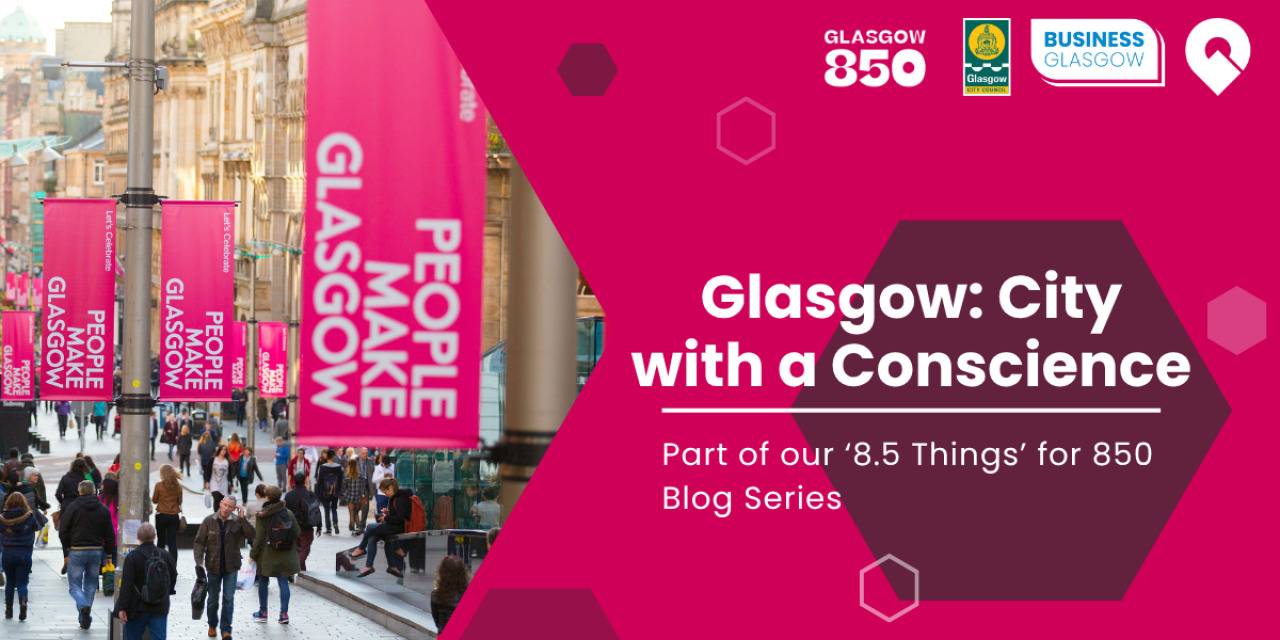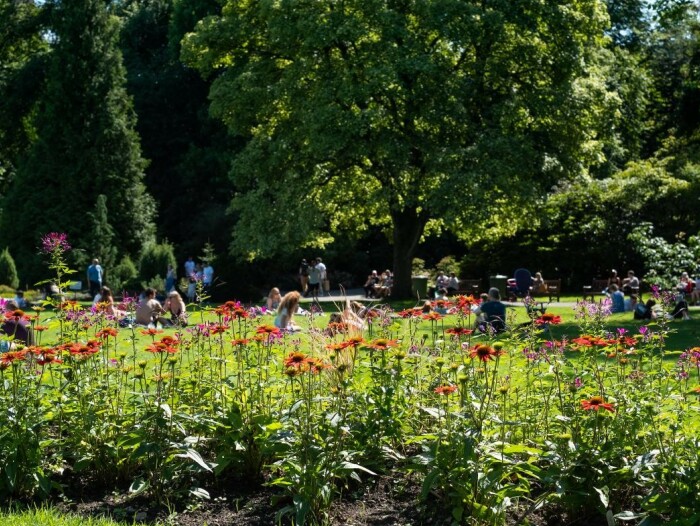City with a Conscience
27th Jun 2025

2025 marks a monumental milestone in Glasgow’s rich history: its 850th birthday. To commemorate this remarkable anniversary, we are excited to launch the Glasgow 850 Blog. With each monthly theme, we’ll bring you fresh insights, stories, and highlight 8.5 things to know about Scotland's largest city; showcasing the key facts and hidden gems that make Glasgow one of the most exciting cities to live, work, and invest in.
Welcome to the June edition of our Glasgow 850 Blog: celebrating 850 years of innovation, culture, and community.
Glaswegians are fiercely loyal, open and friendly. With this comes a strong sense of community and pride, we look out for our neighbours and friends. This month we explore 8.5 things that make Glasgow a city with a conscience. Read on to find out more…
1. Volunteers
Major events in Glasgow have a tradition of being supported by dedicated volunteers: from the Clydesiders who helped make the 2014 Commonwealth Games a success to the current crop of volunteers who are supporting Glasgow 850.
The 2014 Commonwealth Games were the first time Glasgow experienced such a burst of event volunteering and it set the standard for major sporting events in the city. Volunteers bring crucial assistance to bolster the workforce with Glaswegians contributing to the overall experience and welcome during game time.
The enthusiasm for volunteering at major events is a direct legacy of the Commonwealth Games and recent events including the World Indoor Athletic Championships 2024, the UCI Cycling Worlds, the 2018 European Championships, the World Indoor Athletics and the Euro 2020 fan zone were staffed by dedicated volunteers.
The Glasgow 850 volunteer programme is managed by Volunteer Glasgow and they offer other a plethora of volunteer apportunities beyond Glasgow 850 including community development, befriending/mentoring, training, community care, and advisory services.
2. No One Left Behind
 Working with the Local Employability Partnership (LEP), Glasgow Futures, Glasgow City Council’s employability team is dedicated to supporting citizens of all levels and all abilities into work.
Working with the Local Employability Partnership (LEP), Glasgow Futures, Glasgow City Council’s employability team is dedicated to supporting citizens of all levels and all abilities into work.
Glasgow Futures works to achieve an inclusive, sustainable economy where wellbeing and mitigating poverty are central, and employability is pivotal in delivering social and economic equality. Through partners they deliver a model of support that is tailored and responsive to the needs of people of all ages who want help and support on their journey towards and into work.
3. Trade Unions
Glasgow has a rich history of trade unionism and is regarded as the birthplace of the trade union movement in Scotland.
The Glasgow Trades Council, established in 1857, played a vital role in organizing workers and advocating for their rights, even contributing to the creation of the Scottish Trades Union Congress in 1897. This history is reflected in Glasgow's museum collections, which hold a vast array of materials documenting the evolution of trade unionism from its origins to significant historical events.
Glasgow Museums has a collection of approximately 1,500 objects related to Glasgow Trade Unionism which date from between 1765 and 1996. This collection contains banners, badges, certificates, ceramics and glassware, posters, leaflets,
4. Just Transition
 Glasgow City Council is committed to becoming net zero carbon by 2030. A shift to a greener economy will result in new jobs being created, some jobs being substituted for others, some being redefined, and others being eliminated completely. The transition to a net zero and climate resilient economy is a significant opportunity for Glasgow with potential to stimulate inclusive growth and enhance productivity whilst addressing the climate emergency.
Glasgow City Council is committed to becoming net zero carbon by 2030. A shift to a greener economy will result in new jobs being created, some jobs being substituted for others, some being redefined, and others being eliminated completely. The transition to a net zero and climate resilient economy is a significant opportunity for Glasgow with potential to stimulate inclusive growth and enhance productivity whilst addressing the climate emergency.
In this process, Glasgow has committed to a sustainable, low-carbon economy that is fair and inclusive. A Just Transition ensures that no one is left behind, especially workers and communities reliant on carbon-intensive industries. It acknowledges that transitioning to a greener economy may have negative impacts on certain groups and aims to mitigate these impacts through proactive measures like retraining programs, social safety nets, and economic diversification.
5. Social Innovation Challenge Fund
Launched at last year’s State of the City Economy Conference, the Social Innovation Challenge Fund aims to help underrepresented groups overcome systemic barriers to becoming successful entrepreneurs.
After a robust engagement and application process, awards totalling £230,907.00 have been made to four applicants:
- Collective Communities CIC: Collective Communities Circle
This initiative focuses on building strong, resilient communities by supporting local projects that address social issues. It aims to create a positive impact by fostering collaboration and innovation among community members.
- Community Renewal Trust : Roma Entrepreneurship/Start-Ups Programme
This programme aims to support community-led initiatives that address social and economic challenges in Glasgow. It focuses on empowering local communities to develop sustainable solutions and improve their quality of life.
- Gilded Lily Inspiring CIC: Her Future Enterprises
This initiative seeks to inspire and support females from underrepresented groups to start their own businesses. It provides training, mentorship, and access to resources to help aspiring entrepreneurs turn their ideas into viable enterprises.
- West of Scotland Regional Equality Council (WSREC): Bridge to Business - Minority Ethnic Pathway to Progress
This initiative aims to promote equality and diversity in the business sector. It provides support to minority ethnic communities and other underrepresented groups to help them overcome barriers to entrepreneurship and achieve their business goals.
6. Local Rallying Points
 There are a few places in Glasow that, over the centuries, have become central to the city’s social and cultural heritage. These include George Square and Glasgow Green.
There are a few places in Glasow that, over the centuries, have become central to the city’s social and cultural heritage. These include George Square and Glasgow Green.
Not just the civic heart of our city but George Square is a place where Glaswegians gather. The Square is the result of the 18th century development of Glasgow’s “New Town” and has become a much-loved location for music, sport, ceremonies and celebrations, political gatherings, and Remembrance Day parades.
Glasgow Green on the other hand is by far the oldest park in the city. Initially it was used for washing, bleaching linen, grazing, drying fishing nets and for swimming. For centuries it was the city's only green public open space.
Over the centuries both have been witness to a number of political and social rallies and gatherings. Today, George Square is often the meeting point for rallies and protests while marches traditionally end on Glasgow Green.
7. Refuweegee
Set up in 2015, this Glasgow-based charity is a play on the nickname for a Glasgwegian: Weegie. The community-led organisation provides personal welcome packs, essentials and emergency support items to those arriving in Glagow. In 10 years, they have distributed over 10,000 packs to those forced to flee their homes ensuring that they arrive in Scotland to a warm welcome. Learn more about Refuweegee.
8. Feminist City
 Glasgow is recognized as the UK's first "feminist city". In October 2022, Glasgow City Council passed a motion to place women and girls at the centre of city planning and development. This initiative, which originated from discussions during the UN’s Climate Change Conference (COP26), seeks to create a city that is more inclusive and equitable for all its residents by addressing inequalities through urban planning and design.
Glasgow is recognized as the UK's first "feminist city". In October 2022, Glasgow City Council passed a motion to place women and girls at the centre of city planning and development. This initiative, which originated from discussions during the UN’s Climate Change Conference (COP26), seeks to create a city that is more inclusive and equitable for all its residents by addressing inequalities through urban planning and design.
Glasgow’s City Development Plan will incorporate a feminist lens, ensuring that women and girls are considered in all aspects of planning, public realm design, policy development, and budgeting. Sometimes called Feminist Urbanism, gender equality of course benefits everyone and leads to more inclusive design in cities.
8.5 Nelson Mandela Place
Support for the imprisoned Nelson Mandela was widespread in Scotland in the 1980s. In 1986 a street in the City Centre was renamed Nelson Mandela Place which proved awkward for the South African embassy that was then located on the very same street.
Nelson Mandela was also awarded the Freedom of the City in 1981 and formally presented the award on 9 October 1993 at a ceremony in the City Chambers.
Today, the gushet where West George Street meets Buchanan Street at the Tron Church is still called Nelson Mandela Place.




